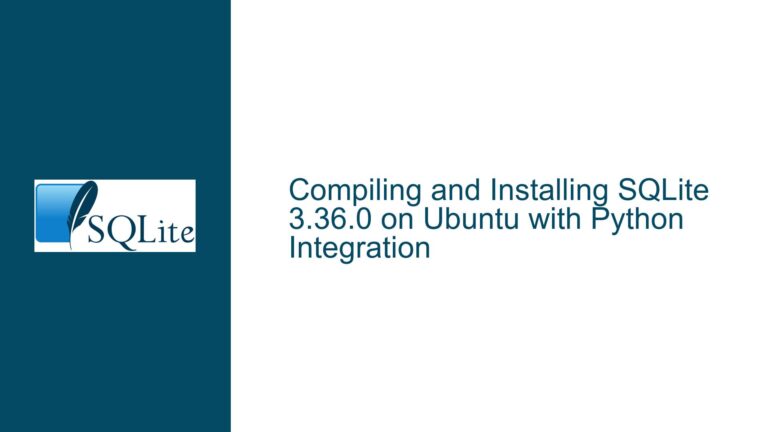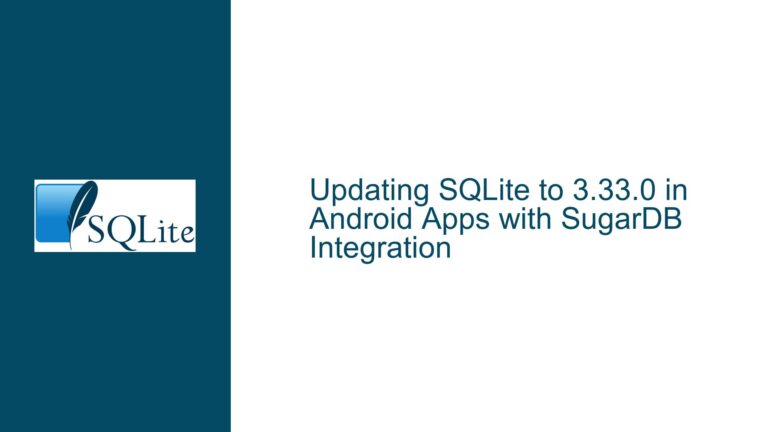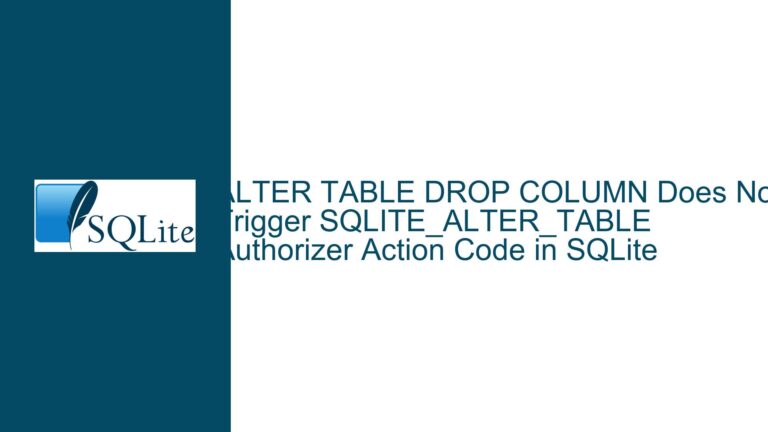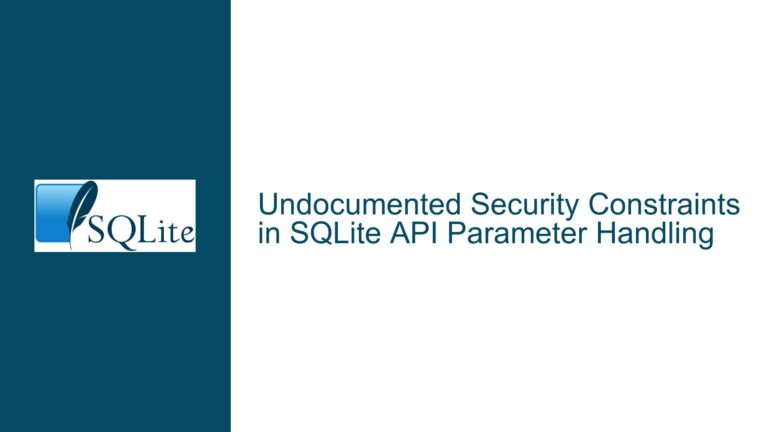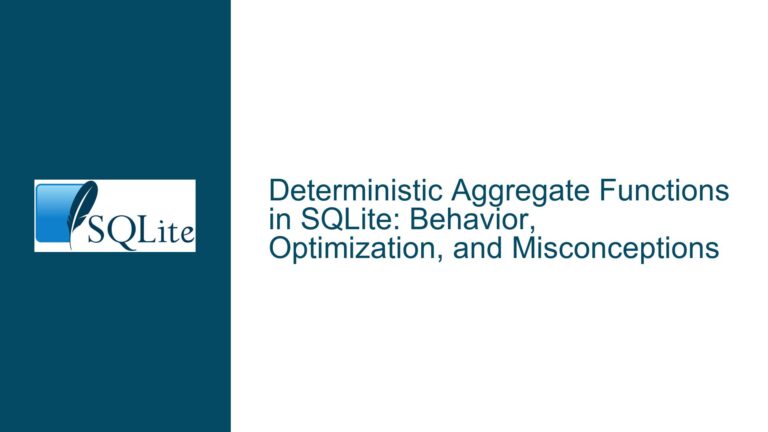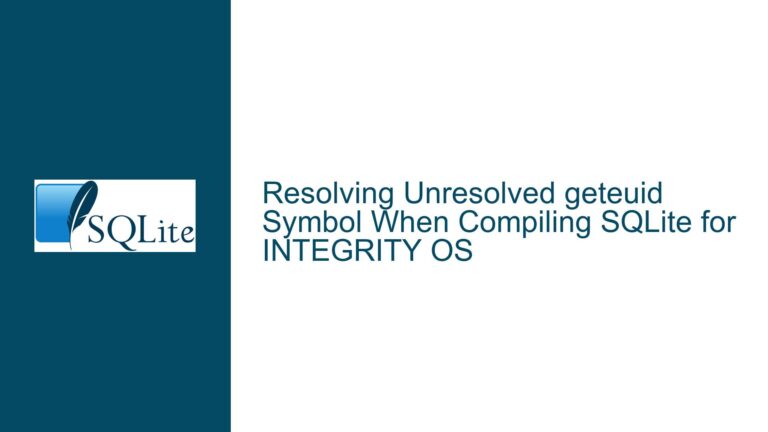Optimizing SQLite WASM Builds: WASI Compilation and Size Reduction Strategies
Compilation Method Impact on SQLite WASM Performance and Size
The choice of compilation toolchain for SQLite in WebAssembly (WASM) environments directly impacts binary size, performance, and feature availability. Traditional approaches like Emscripten-based builds (e.g., wa-sqlite, sql.js) differ fundamentally from WASI SDK compilation in their handling of system interfaces and memory management. WASI (WebAssembly System Interface) provides a standardized API for system-level operations, enabling more efficient interaction with browser-hosted file systems and JavaScript environments.
When compiling SQLite via WASI SDK with --with-wasi-sdk=DIR, developers bypass Emscripten’s JavaScript glue code, potentially reducing indirect function call overhead. However, this approach requires meticulous configuration of SQLITE_OMIT_* flags in sqlite_cfg.h to eliminate unused features. For example, disabling statement rollback capabilities or specific collation sequences can yield measurable size reductions. The WASI-compiled SQLite binary discussed in the forum achieves 1.5MB uncompressed (530KB gzipped) with R-trees, FTS5, JSON, and math functions – a significant achievement given the baseline SQLite WASM build typically ranges from 800KB to 2MB depending on optimization flags.
A critical factor in WASI-based compilation is the treatment of VFS (Virtual File System) layers. Browser-based SQLite implementations require custom VFS modules to interface with storage mechanisms like the Origin Private File System (OPFS) or HTTP range requests. The WASI toolchain’s ability to dead-code eliminate unused VFS modules during linking prevents bloating the binary with unnecessary filesystem drivers. Developers must verify that their chosen VFS (e.g., in-memory, HTTP, or file-picker) doesn’t inadvertently pull in legacy POSIX file I/O code from SQLite’s default configuration.
WASM Binary Size Discrepancies and Feature Inclusion Trade-offs
SQLite’s modular architecture allows enabling/disabling features at compile time, but misconfigured build flags often lead to unexpected binary bloat. The forum discussion highlights a 1.5MB WASM binary containing R-trees, FTS5, JSON, and math functions. While this seems reasonable, further size reduction requires analyzing three key areas: SQLITE_OMIT_* flags, compiler optimization levels, and post-compression techniques.
First, JSON support is now enabled by default in SQLite 3.45+, adding ~50KB uncompressed. Disabling it via -DSQLITE_OMIT_JSON requires careful testing, as many applications depend on JSON functions. Similarly, FTS5 (Full-Text Search) contributes ~150KB, while R-trees add ~120KB. Developers must evaluate whether these features justify their size cost. For instance, applications performing geospatial queries require R-trees, but a simple key-value store could omit them.
Second, compiler optimization flags like -Os (optimize for size) versus -O3 (maximum speed) impact both performance and binary size. WASI SDK’s LLVM backend allows advanced optimizations like LTO (Link Time Optimization) and function section splitting. However, aggressive size optimization might degrade query execution speed by 10-20%, necessitating benchmarking. The forum’s 1.5MB binary likely uses -Os combined with -ffunction-sections and -fdata-sections to enable dead code elimination during linking.
Third, compression efficiency varies across WASM binaries. Gzip achieves ~65% reduction (1.5MB → 530KB), but Brotli can reach 70-75% with higher compression levels. Deploying servers with Brotli support and configuring Content-Encoding headers appropriately is essential. Additionally, runtime compression via Service Workers can dynamically compress cached databases.
VFS Implementation Challenges in Browser-Based SQLite Environments
Browser security restrictions impose unique constraints on SQLite VFS implementations, particularly regarding file locking, concurrent access, and cross-origin resource sharing. The forum project implements three VFS types: in-memory, OPFS-backed persistent storage, HTTP range requests, and a file-picker interface for local file editing. Each presents distinct challenges.
The HTTP VFS, inspired by phiresky’s SQLite-over-GitHub Pages approach, relies on servers supporting Range headers (HTTP 206 Partial Content). While effective for read-only databases, this method cannot handle writes unless combined with a client-side delta encoding layer. Developers must implement ETag-based versioning and cache invalidation to prevent stale data reads. Furthermore, CORS policies must allow cross-origin range requests, which many CDNs disable by default.
The Origin Private File System (OPFS) VFS offers persistent storage but lacks traditional file locking mechanisms. Concurrent writes from multiple browser tabs may corrupt databases unless mitigated via SharedWorker-based write queues or advisory locking using localStorage mutexes. Performance-wise, OPFS synchronous access handles (available in dedicated workers) provide faster read/write speeds compared to asynchronous methods, but require complex worker orchestration.
The file-picker VFS allows editing local SQLite files but operates in a sandboxed environment without direct filesystem access. Users must re-upload the database after each edit, as browsers prohibit persistent local file handles. Implementing atomic commits requires writing changes to a temporary in-memory database, then triggering a download of the modified .sqlite file – a workflow that confuses non-technical users accustomed to desktop database tools.
To resolve these issues, developers should adopt a hybrid VFS strategy: use OPFS for persistent storage with Web Locks API for concurrency control, HTTP VFS for static dataset distribution, and in-memory databases for ephemeral analytics. For local file editing, integrating with the File System Access API (where supported) provides more seamless file handle retention across sessions.
Troubleshooting WASI-SQLite Integration and Browser-Specific Failures
Symptom 1: Undefined WASI Import Errors During Instantiation
This occurs when the WASM binary expects host functions (e.g., fd_read, proc_exit) not provided by the JavaScript environment. Unlike Emscripten, WASI builds require explicit polyfilling of WASI syscalls. Solutions:
- Link with
-Wl,--no-entry: Ensures WASI libc doesn’t require_startinitialization. - Implement dummy syscalls: For non-essential functions like
random_get, stub them viaWebAssembly.instantiate(wasmModule, {wasi_snapshot_preview1: { /*...*/ }}). - Use
wasi-jspolyfill: Packages like@bjorn3/browser_wasi_shimemulate missing WASI interfaces.
Symptom 2: VFS File Locking Failures in Multi-Tab Environments
Browsers isolate storage APIs (OPFS, IndexedDB) per origin but allow concurrent access across tabs. Without proper locking, simultaneous writes corrupt databases. Fixes:
- Web Locks API: Acquire locks before writing:
navigator.locks.request('database_lock', async lock => { await sqlite.run('INSERT INTO ...'); }); - OPFS
syncAccessHandlecoordination: UseAtomics.wait()on a SharedArrayBuffer to create mutexes around file handles.
Symptom 3: HTTP VFS Range Request Timeouts on Large Databases
Fetching multi-gigabyte databases via HTTP range requests may stall due to TCP congestion control or CDN throttling. Mitigation strategies:
- Pre-fetch metadata: Cache
SELECT * FROM sqlite_schemaearly to allow query planning without full downloads. - Range request coalescing: Combine adjacent small reads (e.g., B-tree page traversals) into larger 1MB requests.
- Service Worker caching: Intercept
Rangerequests and serve from Cache API when possible.
Symptom 4: Math Functions Returning Incorrect Results in WASM Build
SQLite’s math functions (e.g., sin(), log()) rely on libm implementation differences. WASI’s libc may use lower-precision approximations compared to Emscripten. Solutions:
- Compile with
-DSQLITE_ENABLE_MATH_FUNCTIONS=1: Ensure math functions are explicitly enabled. - Override functions via
sqlite3_create_function(): Implement higher-precision versions in JavaScript usingMath.sinetc., then register them as SQL user functions.
Symptom 5: FTS5 Queries Failing with ‘Tokenization Error’
WASI builds may exclude ICU tokenizers due to missing Unicode dependencies. Workarounds:
- Use Porter tokenizer: Rebuild FTS5 with
-DSQLITE_ENABLE_FTS5 -DSQLITE_FTS5_DISABLE_ICU. - Custom JavaScript tokenizer: Split text via
Intl.Segmenterand feed tokens to FTS5 via contentless tables.
Advanced Optimization Techniques for Production-Grade Deployments
Differential Serving Based on Client Capabilities
Detect support for OPFS synchronous access handles and Brotli compression via client hints:const useOPFS = ('createSyncAccessHandle' in FileSystemFileHandle.prototype); const useBrotli = (await navigator.userAgentData.getHighEntropyValues(['acceptEncoding'])).acceptEncoding.includes('br');Serve optimized WASM binaries (e.g., OPFS-enabled vs. in-memory-only) and pre-compressed assets accordingly.
WASM Streaming Instantiation with Cache Probing
Reduce initial load latency by caching compiled WASM modules in IndexedDB:async function compileWasm(url) { const cache = await caches.open('wasm-cache'); const resp = await cache.match(url); if (resp) return WebAssembly.compile(await resp.arrayBuffer()); const freshResp = await fetch(url); await cache.put(url, freshResp.clone()); return WebAssembly.compile(await freshResp.arrayBuffer()); }Selective VFS Initialization
Delay loading non-critical VFS modules until needed. For example, only initialize the HTTP VFS when a user attempts to open a remote database URL:sqlite3.vfsRegister('http', async () => { const { HttpVFS } = await import('./http-vfs.mjs'); return new HttpVFS(); }, { require: 'demand' });Tree-Shaking SQLite Extensions via Dynamic Linking
Split rarely-used features (e.g., R-tree, FTS5) into separate WASM modules loaded on-demand:# Compile main SQLite without extensions clang -DSQLITE_OMIT_LOAD_EXTENSION -o sqlite-main.wasm ... # Compile FTS5 as a loadable extension clang -shared -DSQLITE_CORE -o fts5.extension.wasm ...Load extensions via
sqlite3.loadExtension('fts5.extension.wasm')when required.
Final Recommendations for Browser-SQLite Implementations
Benchmark Across Browser Engines
Test VFS performance in Chromium (OPFS sync handles), Firefox (asynchronous OPFS), and Safari (no OPFS support). Use feature detection to fallback to in-memory or IndexedDB storage where necessary.Audit SQLITE_OMIT_ Flags Quarterly*
SQLite’s default configuration evolves – regularly review disabled features against release notes. For example, SQLITE_OMIT_AUTOINCREMENT was deprecated in 3.42.0.Implement Cross-Tab Change Notifications
Use BroadcastChannel or localStorage events to notify other tabs about database updates, ensuring UI consistency:sqlite3.onUpdate((dbName, changedTables) => { localStorage.setItem('db-update', JSON.stringify({ dbName, changedTables, timestamp: Date.now() })); }); window.addEventListener('storage', (e) => { if (e.key === 'db-update') handleExternalUpdate(JSON.parse(e.newValue)); });Adopt WASM Component Model for Future-Proofing
As the WASM Component Model matures, encapsulate SQLite as a reusable component with clearly defined VFS and UDF (User Defined Function) interfaces, enabling safer interoperation with other WASM modules like Python’s Pyodide.

